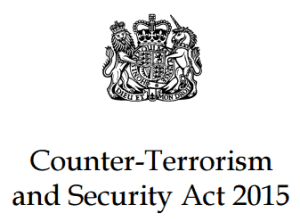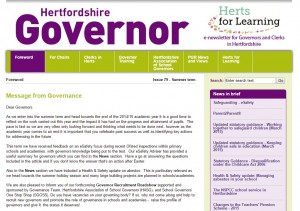Childcare Disqualification Requirements
The DfE has recently issued supplementary advice regarding school staff and volunteers (including governors) of schools/academies which have children under the age of 8.
The changes come into effect immediately.
If you are the Chair of a primary or nursery school/academy – the advice from DfE is that it applies to all staff and volunteers.
If you are the Chair of a secondary school/academy – the advice is that it will only apply to staff who may carry out teaching in primary schools or children’s centres.
What to do –
All existing governors in primary/nursery schools and academies will have to complete a governor declaration form and give it to either the Chair or Headteacher to countersign.
A copy of the Governor Declaration Form can be downloaded below: section 2 on this form is new – it covers the additional areas which the declaration by governors now has to cover. The other 3 supplementary documents cover the DfE’s advice and frequently asked questions (“FAQs”) which governors may ask . It is essential that all existing governors complete the declaration form. You may find it easiest for these documents to be issued in advance of a GB meeting and then returned completed by governors at the meeting.
All new governors in primary/nursery schools and academies – will be sent the new form to complete by HfL Governance.
Head teachers have been written to separately by HfL Schools HR with regard to how these changes affect school staff.
Supplementary Documents
The documents referred to above are provided here either in ‘cut-and-paste’ form or as downloadable documents:
Childcare Disqualification Requirements – FAQs
Frequently Asked Questions
Note: In the following we use “staff” to cover staff, volunteers and governors
1. Why has this advice only just been issued when the Regulations have been in force since 2009?
The DfE have not provided a satisfactory answer to this – they simply said “The Department was asked to clarify what the position was for schools and it became clear that some supplementary advice to sit alongside the Keeping children safe in education guidance would be helpful for schools.”
2. Given the fact that these Regulations have been in force since 2009, has the DfE taken advice about the employment law risk of effecting a dismissal on the basis of these Regulations now, in respect of someone who has been employed for a number of years?
The DfE said: These regulations have been in force for a number of years and we would expect that schools will take appropriate action where individuals may be caught by the requirement, or where they are made aware that someone working at the school should be disqualified. Legal advice confirms that the Regulations must be enforced and HR will support schools with action arising from any positive declarations.
3. For existing staff, volunteers and governors – is the advice that a self-declaration is sufficient or is any declaration expected to be verified wherever possible, for example by viewing a current DBS check or obtaining a new one, and are employers expected to verify the absence of any Orders or restrictions
There is no requirement to check DBS certificates for existing staff/governors and there is no evident process for verifying if someone has a childcare order or other restriction against them. It seems that self-declarations are acceptable. For new staff, the individual should sign a declaration and the DBS certificate should be checked against the list of offences in the Schedules. Of course, other offences may also lead to non-employment under normal DBS assessment processes.
Note: Governors of maintained schools should only be asked to complete a DBS form where the GB has agreed that all new governors complete these; all governors in academies and free schools are required under the academies regulations to complete DBS forms.
4. How can we do checks on “householders”
The DfE’s response: It is not the employer’s role to carry out a check on individuals other than those they employ, however employers should have effective systems in place to ensure that staff are suitable to work in childcare. Employees who work in the specified early and later years provision should be asked to provide the necessary information about any person who lives in the same household as them.
5. How do these Regulations sit with the Data Protection Act, particularly in respect sensitive personal data relating to someone not employed in the school (i.e. a householder) and the school passing information to OFSTED,?
The DfE simply indicates that information must be processed in accordance with the Data Protection Act. The Childcare (Disqualification) Regulations require employers to pass information to OFSTED and such statutory duties are allowed under the Data Protection Act. Clearly schools must handle and store all information in school carefully, in accordance with normal Data Protection rules.
6. The DfE guidance refers to “staff who work in the relevant provision” – does this include all staff employed eg including the caretaker or only those directly involved in care and supervision?. If the latter, in a Primary/Junior School, does this include the Year 6 teacher/LSA who may on not teach under 8s but may at any time be involved in their care or supervision (eg trips, playground duty etc).
The DfE says: The Childcare Act stipulates that a disqualified person should not be employed in connection with early or later years childcare and that they should not be directly concerned in the management of that provision. A person who sometimes works in the relevant childcare provision would be included in this definition; however, decisions need to be taken by schools on a case by case basis subject to their individual circumstances.
7. What about contractors and agency staff?
Employers are responsible for ensuring that persons caring for children are suitable to work with children. In the case of workers that are supplied by an agency or third party organisation, schools should ensure that the agency or organisation has carried out the relevant checks.
8. How long will it take to process an application for a disqualification waiver?
The DfE says: It is a matter for Ofsted who have the responsibility for granting a waiver or not. The time it will take to process a waiver application will undoubtedly vary from case-to-case; whilst many should be straightforward, others will unfortunately be more complex and take time to resolve.
9. Does this check need to be on the Single Central Record (SCR)?
Neither the DFE Guidance, nor the Regulations, require this check to be on the SCR although schools may feel more secure adding it on.
10 Who do the regulations apply to?
a) Do Governors need to be asked to complete a disqualification declaration?
The Regulations are unclear but we conclude that Governors fall under the category “those who are directly concerned in the management of such early or later years provision” and are therefore covered by the Regulations.
Governorance will be issuing, via Clerks, an updated Governor Self-Declaration Form (dated November 2014) which all Governors should sign and which should be used for new Governors.
Secondary school Governors would only be covered by the Regulations if the school provides child care for under 8s.
b) What constitutes childcare outside of the normal school day?
Child care includes breakfast clubs, homework clubs, nursery and crèche provision provided by the school.
Where activities are run by other providers on school premises but not managed by the school (eg lettings, football clubs), these are not covered as they are not child care provision.
11 What convictions/cautions etc have to be declared?
a) Where are the disclosable offences set out?
The relevant crimes are listed in Schedules 2 and 3 although it is appreciated that these are complex to understand. The key offences are any offences against or involving children and any sexual offence against an adult. We believe that in the vast majority of cases, people with relevant offences will have been declined employment through the DBS process but we appreciate this may not always be the case (particularly in the case of long standing staff who may never have had a DBS check).
b) Are offences like GBH and ABH of adults included?
We have recently clarified that violent offences against adult which do not have a sexual element are not grounds for disqualification. So only offences such as rape, sexual assault etc would be covered.
c) The reference to Burglary in Schedule 2 seems anomalous – why is it there?
This refers to Burglary under the 1968 Theft Act which was actually Burglary involving rape so would only be applicable if someone was charged with this specific offence – which in turn comes under key offences outline in Q4.
d) Schedule 2 refers to repealed statutory offences – does this mean they do not apply?
No – “repealed” does not mean these no longer apply, it means they have been superseded by other legislation but would still be a cause for disqualification if someone has been convicted of, cautioned etc. for any of these offences.
e) What if a person is not sure whether they have a relevant offence?
We would advise declaration of anything that they think may be relevant and schools can check with the DfE (mailbox.disqualification@edcuation.gsi.uk) or we can seek advice from legal.
12 General
a) How is it that it has only just been decided to apply these Regulations in schools?
We understand that the Regulations were designed for child care organisations – aimed at protecting children e.g. where people are doing child care in their home etc. The DfE had therefore determined that they were not applicable to educational organisations. This has now been overturned and so the DfE has had to advise on their implementation in schools.
b) Who is going to check that schools comply?
This is unclear but we imagine that OFSTED will include this as part of their overall safeguarding/Single Central Record checks.
c) Are people required to ask their householders if they are disqualified?
No we do not believe there is any requirement for this. Staff are required to declare “to the best of their knowledge” and schools can accept declaration at face value.
d) Is the Disciplinary Procedure being updated?
We are looking at this but do not envisage many, if any, changes are necessary.
Childcare Disqualification Requirements – Guidance for Schools
We have received supplementary advice to the “Keeping Children Safe” Statutory Guidance from the DfE detailing a new requirement for childcare disqualification checks to be carried out on relevant staff working in schools and academies. https://www.gov.uk/government/uploads/system/uploads/attachment_data/file/362919/Keeping_children_safe_in_education_childcare_disqualification_requirements_-_supplementary_advice.pdf
These checks arise from the Childcare (Disqualification) Regulations 2009, which in turn arose out of the Education Act 2006.
The Regulations prohibit anyone who is disqualified themselves under the Regulations, or who lives in the same household as a disqualified person, from working in a relevant settings, including in schools.
What are relevant staff and relevant settings?
The following categories of staff in nursery, primary or secondary school settings are covered by the Childcare (Disqualification) Regulations 2009.
- staff who work in early years provision (including teachers and support staff working in school nursery and reception classes);
- staff working in later years provision for children who have not attained the age of 8 including before school settings, such as breakfast clubs, and after school provision;
- staff who are directly concerned in the management of such early or later years provision.
The Regulations refer to employing a person “in connection with” these provisions and we therefore conclude that:
In Infant and Nursery Schools – All staff will be covered
Primary/Junior Schools – All staff are covered as it is unlikely in such settings that staff are always exclusively working with those over the age of 8.
Secondary Schools – will need to undertake checks on relevant staff (including managers) where any services are provided where under 8s may be in attendance eg childcare facilities, before or after school clubs
“Staff” includes volunteers and, therefore, includes governors
Who is disqualified?
A person is disqualified if any of the following apply:
- they have been cautioned for, or convicted of certain violent or sexual criminal offences against adults and any offences against children;
- they are the subject of an Order, direction or similar in respect of childcare, including orders made in respect of their own children’
- that have had registration refused or cancelled in relation to childcare of children’s homes or have been disqualified from private fostering;
- they live in the same household where another person who is disqualified lives or works (disqualification ‘by association’). This means that the householder has an order, restriction, conviction, caution etc. set out in the Legislation. It is accepted that staff may not necessarily know this information – the declaration requires them to answer “to the best of their knowledge”
Full details of what constitutes “disqualification” are in the Schedules to the Regulations http://www.legislation.gov.uk/uksi/2009/1547/contents/made.
What should schools do now?
There are four key actions required
- All relevant staff (including volunteers and governors) in relevant settings must be asked to complete a declaration as soon as possible, affirming that they are not disqualified. A declaration form is attached. Schools should print the Schedules to the Regulations (which detail the disqualification orders, offences etc) and make these available for staff (either with each form or in a central place) for reference. The links are here:
http://www.legislation.gov.uk/uksi/2009/1547/schedule/1/made
http://www.legislation.gov.uk/uksi/2009/1547/schedule/2/made
http://www.legislation.gov.uk/uksi/2009/1547/schedule/3/made
- Schools should contact their Schools’ HR Advisor immediately if they
i. know now of anyone in their employment who is or may be disqualified
ii. receive a positive declaration from any member of staff/governor
Anyone who is disqualified will need to be immediately removed from the relevant setting (probably through suspension in the case of employees) and OFSTED must be notified within 14 days.
- All new appointments (including new volunteers/governors) in relevant settings, from this point onwards, must be required to complete the declaration prior to commencing work and DBS certificates should be checked with reference to list of relevant offences in the Act (Schedules 2&3). In the case of new governors, schools must make sure they are using the updated Governor Pre-Appointment Declaration form
- Schools must ensure that any external agency providing relevant staff in relevant settings carry out these checks prior to placing them in the school.
You will need to set a short deadline for the return of the form – one week would be reasonable. Where a member of staff or volunteers/governors do not complete and return the form, it may be necessary to take action to remove them from work. Please seek Schools’ HR Advice in these cases.
Schools’ HR will make contact with Trade Unions and Professional Associations regarding this matter so that they are aware of our advice.
Disqualified Workers
The Schools’ HR team (01438 844873) will support schools in dealing with cases where a disqualified person is identified. A disqualified person can apply to OFSTED for a waiver. http://www.ofsted.gov.uk/resources/applying-waive-disqualification-early-years-and-childcare-providers
OFSTED may grant a full or partial waiver, including a waiver that would allow an individual to work in a relevant school setting. Whilst a waiver application is under consideration the individual must not continue to work in these settings.
Where a waiver is not granted, the employee will need to be dismissed unless redeployment options are available.


 January 2016 HfL Chairs’ Briefing
January 2016 HfL Chairs’ Briefing The School Food Standards, as you may be aware, came into force in January 2015 and legally require all schools, excluding academies established between September 2010 and June 2014, to make milk available to children at any time during the school day.
The School Food Standards, as you may be aware, came into force in January 2015 and legally require all schools, excluding academies established between September 2010 and June 2014, to make milk available to children at any time during the school day.

